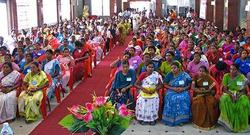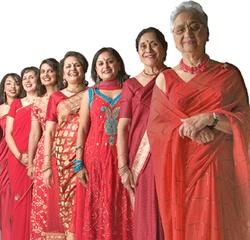 Today Rajya Sabha passed Women’s Reservation Bill by an overwhelming majority to reserve one-third of seats in Lok Sabha and Assemblies for women. The Bill seeks to reserve for women 181 of the 543 seats in the Lok Sabha and 1,370 out of a total of 4,109 seats in the 28 State Assemblies. This reservation shall apply in case of seats reserved for scheduled castes (SCs) and scheduled tribes (STs) as well. The implementatation of this bill will increase the participation of women in politics and society and ultimately create equal opportunities for men and women. It will also give importance to the status of women in Indian society.
Today Rajya Sabha passed Women’s Reservation Bill by an overwhelming majority to reserve one-third of seats in Lok Sabha and Assemblies for women. The Bill seeks to reserve for women 181 of the 543 seats in the Lok Sabha and 1,370 out of a total of 4,109 seats in the 28 State Assemblies. This reservation shall apply in case of seats reserved for scheduled castes (SCs) and scheduled tribes (STs) as well. The implementatation of this bill will increase the participation of women in politics and society and ultimately create equal opportunities for men and women. It will also give importance to the status of women in Indian society.
Prime Minister Manmohan Singh described the occasion as a “momentous” and the legislation as a “historic and great” step in the empowerment of women. He also said that Indian women have faced “enormous difficulties” in terms of benefits of economic and social development, and the passing of this “historical and path-breaking legislation” will prove a “giant step forward” for their empowerment and emancipation. Let’s try to understand more about this bill.
 The aim of this bill is to reserve 33.3 percent seats in Parliament and state legislatures for women. It was drafted first by the H D Deve Gowda-led United Front government. The Bill was introduced in the Lok Sabha on September 12, 1996. Though it has been introduced in Parliament several times since then, the Bill could not be passed because of lack of political consensus. Some of the political parties like RJD, SP, BSP etc have always opposed this bill because they fear many of their male leaders would not get a chance to fight elections if 33.3 percent seats are reserved for women.
The aim of this bill is to reserve 33.3 percent seats in Parliament and state legislatures for women. It was drafted first by the H D Deve Gowda-led United Front government. The Bill was introduced in the Lok Sabha on September 12, 1996. Though it has been introduced in Parliament several times since then, the Bill could not be passed because of lack of political consensus. Some of the political parties like RJD, SP, BSP etc have always opposed this bill because they fear many of their male leaders would not get a chance to fight elections if 33.3 percent seats are reserved for women.
The Bill has also been opposed by politicians from the socially and economically backward classes. They argue that reservation would only help women of the elitist groups and rich classes to gain seats in parliament and legislative assemblies and it will ultimately lead to more discrimination and under-representation to the poor and backward classes of society.

I am in favor of this bill as women empowerment needs a helping hand in this stage of our democracy.
I also fully support this bill. This will play great role in women empowerment and upliftment in India.
I feel that demanding 33 % reservation for women in Parliament shows that women cannot make it on merit. Most of us claim that women are equal to men in all respects then why we need this reservation? Let us compete with men as equals..
No Seats Reserved for Men all are common, that every women should understand, any one can participate in election, if any one have the public support you can get the seat in ruling party also, none of us not ready to involve in politics, this 33% who is going to utilize for example, last time who is involved or elected person’s Wife or Daughter going to get the seats, but the power remains in the same hand or person.
several persons says that reservation for ladies improves democracy “It looks like connecting a rope to a buffalo and forcefully try to push in politics”.
i completely support this bill…this bill will give a way for the empowerment of women…..but the above statement by kavya is completely absurd………….